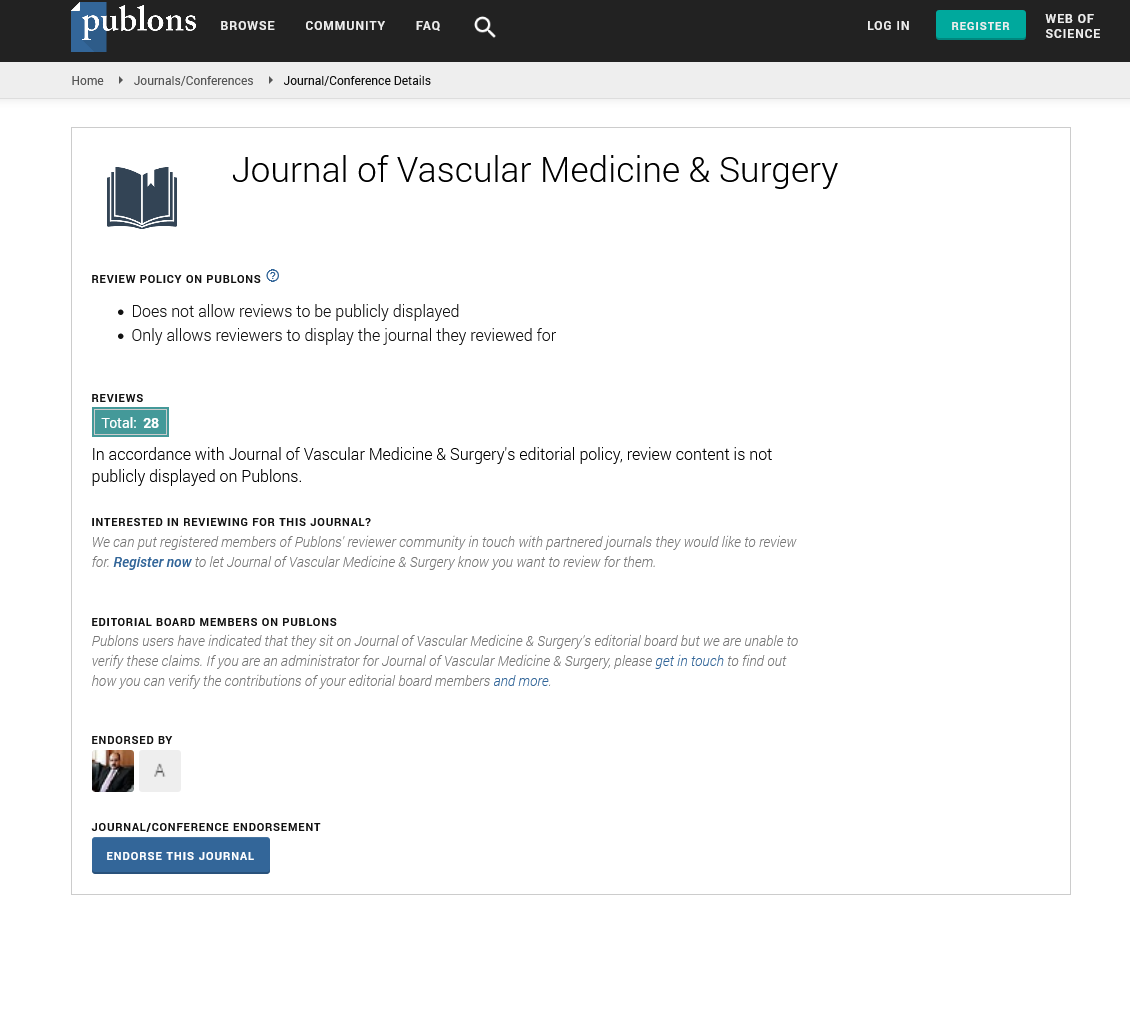Indexed In
- Open J Gate
- Academic Keys
- RefSeek
- Hamdard University
- EBSCO A-Z
- OCLC- WorldCat
- Publons
- Euro Pub
- Google Scholar
- SHERPA ROMEO
Useful Links
Share This Page
Journal Flyer

Open Access Journals
- Agri and Aquaculture
- Biochemistry
- Bioinformatics & Systems Biology
- Business & Management
- Chemistry
- Clinical Sciences
- Engineering
- Food & Nutrition
- General Science
- Genetics & Molecular Biology
- Immunology & Microbiology
- Medical Sciences
- Neuroscience & Psychology
- Nursing & Health Care
- Pharmaceutical Sciences
Commentary - (2025) Volume 13, Issue 6
A Smarter Heart: Why AI and Blockchain Are the Future of Cardiovascular Disease Detection
Ahemed Asan**Received: 19-May-2025, Manuscript No. JVMS-25- 29212; Editor assigned: 21-May-2025, Pre QC No. JVMS-25- 29212 (PQ); Reviewed: 04-Jun-2025, QC No. JVMS-25- 29212; Revised: 11-Jun-2025, Manuscript No. JVMS-25- 29212 (R); Published: 18-Jun-2025, DOI: 10.35248/2329-6925.25.13.601
Description
Cardiovascular Disease (CVD) remains the leading cause of mortality worldwide, accounting for approximately one-third of all global deaths each year. The multifactorial nature of heart disease—influenced by genetics, lifestyle, environment, and comorbid conditions such as hypertension and diabetes—complicates timely diagnosis and effective management. Despite substantial advances in clinical cardiology, healthcare systems are predominantly reactive, often identifying patients only after symptomatic disease progression. This delay contributes to increased morbidity, mortality, and healthcare costs.
To address these challenges, a paradigm shift is essential from reactive treatment towards proactive prediction and prevention. Recent technological breakthroughs in Machine Learning (ML) and Block chain present unprecedented opportunities to revolutionize cardiovascular care.
Machine learning for CVD prediction
Machine learning excels in sifting through vast amounts of heterogeneous medical data, including electronic health records, imaging, genetic profiles, and wearable device metrics, to detect complex patterns that escape traditional analysis. In one recent comprehensive study, various ML algorithms—including decision trees, random forests, Naïve Bayes classifiers, K-nearest neighbors, and deep neural networks—were employed to identify early indicators of CVD risk. By leveraging an ensemble voting strategy that combines the strengths of these diverse models, the study achieved a prediction accuracy of 89.2%, marking a significant improvement over classical statistical models.
The critical role of Block chain in securing health data
While machine learning enhances predictive capability, it introduces another challenge: the need to protect sensitive health data. The healthcare sector has become an increasingly frequent target for cyberattacks. Data breaches not only jeopardize patient privacy but also undermine trust in digital health systems and could lead to catastrophic consequences if medical records are altered or lost.
Block chain technology offers a robust solution through its decentralized, immutable ledger architecture. Unlike traditional centralized databases vulnerable to hacking and single points of failure, Block chain distributes data across a network of nodes, where each transaction is cryptographically verified and linked to previous entries. This immutability ensures that once data is recorded, it cannot be tampered with or deleted without detection.
In healthcare, Block chain empowers patients by granting them granular control over who accesses their medical information and under what conditions. Through cryptographic keys and smart contracts, access permissions can be dynamically managed, ensuring that only authorized parties can view or contribute to health records. This transparency and security build a foundation of trust critical for widespread adoption of digital health technologies.
Synergizing AI and Block chain for transformative cardiovascular care
The integration of machine learning and Block chain technologies creates a holistic infrastructure for cardiovascular disease management. On the one hand, ML models analyze real-time patient data streams to predict CVD onset or exacerbation. On the other hand, Block chain safeguards the integrity, confidentiality, and provenance of the data feeding these models.
This synergy facilitates secure data sharing among healthcare providers, laboratories, and specialists across institutions and geographies—critical for coordinated care. Additionally, smart contract protocols can automate compliance with data governance regulations and consent management, reducing administrative overhead and enhancing efficiency.
Despite their promise, implementing AI and Block chain in cardiovascular care is not without obstacles. Data quality and standardization remain pressing issues; ML models require large, representative datasets to avoid biases and ensure generalizability. Block chain systems must be designed for scalability and low latency to accommodate the volume and speed of health data generated daily.
Ethical considerations around data privacy, informed consent, and algorithmic fairness demand multidisciplinary oversight. Regulatory frameworks must evolve to govern the deployment of these technologies while safeguarding patient rights. Finally, successful adoption hinges on interdisciplinary collaboration uniting clinicians, data scientists, engineers, policymakers, and patients. Continuous education and transparent communication are vital to build confidence and address societal concerns.
Conclusion
The battle against cardiovascular disease demands innovation beyond incremental medical advances. Machine learning enables early, personalized prediction of heart disease risk, while Block chain ensures that the sensitive health data underpinning these predictions remain secure, verifiable, and under patient control. Together, these technologies offer a paradigm shift from reactive treatment to anticipatory, patient-centered care. Realizing this potential requires ethical stewardship, robust infrastructure, and collaborative governance.
Citation: Asan A (2025). A Smarter Heart: Why AI and Block Chain Are the Future of Cardiovascular Disease Detection. J Vasc Surg. 13:601
Copyright: 2025 Asan A. This is an open-access article distributed under the terms of the Creative Commons Attribution License, which permits unrestricted use, distribution, and reproduction in any medium, provided the original author and source are credited.

